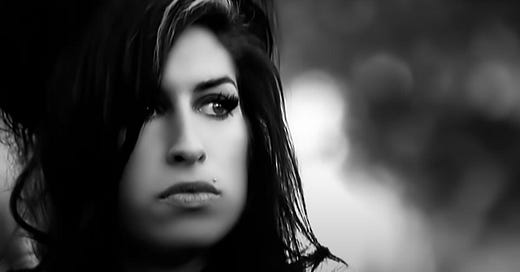Issue 5: The Dark Nights of Amy Winehouse
When the late great Amy Winehouse was at her nadir, photographers waited by her door for something to happen. Then one journalist was invited inside...
Happy New Year, fellow gossipers. I hope you are prepared for what 2024 brings you, or at least appropriately rested and comfortable with the cold dark nights of January (personally, I am neither!) Let’s kick things off with a look back at someone who deserved better and continues to be screwed over long after her death.
When Amy Winehouse died, I cried. This wasn’t my first instance of crying at the passing of a celebrity, nor was it the most I ever sobbed at such a moment. Yet there’s something about Winehouse’s death that has always stuck with me, lingered under the skin and left an indelible impact that shaped much of how I viewed the world in the interim 13 or so years. More than my tears, what I most remember about the aftermath was one of my colleagues at my Summer job callously dismissing Winehouse as a junkie waste of space who got what was coming to her. She was hardly the only person to spout such cruelty, but hearing someone say it to my face felt especially painful. I could get mad at people on Twitter for their smarmy judgment of Winehouse and those who mourned her, but all I could do to this colleague was murmur that it was a bit more complicated than that.
We had spent years watching Winehouse disintegrate before our eyes, smothered by alcohol and drug dependency and eating disorders, and exacerbated by the ruthless hatred of the British tabloids. The word “trainwreck” was used with increasing frequency to describe her, as well as a slew of other insults of similar descript. My brain is depressingly polluted with the jokes made by talk-show hosts and comedians about her, comparing her to neglected animals and sneering at how little they wanted to f*ck her. She died at the age of 27 and it still stung. It was still a shock, even if, as everyone kept telling me, it wasn’t a surprise. The press certainly seemed to be counting down the days, pushing their way into Winehouse’s orbit for a front-row seat. In 2008, Rolling Stone even spent the evening with the singer.
Rolling Stone. "Up All Night With Amy Winehouse." July 10, 2008. Claire Hoffman.
Read the profile here.
2008 was, to put it mildly, a tumultuous year for Winehouse. In February, she received five Grammy Awards, and during the announcement of the nominations, George Lopez called her a drunk. She performed via satellite live from London because her Visa approval hadn't been processed in time. Watching her realize she'd won Record of the Year, her name read aloud by her hero Tony Bennett, always brings tears to my eyes. Her second album, Back to Black, was selling thousands of copies a week. Her tour schedule was tough and erratic, with some performances starting late or not at all. When she was on, she was unbeatable, a pure magnet of charisma. When she was troubled, everyone could tell.
Her husband, Blake Fielder-Civil, was in prison during the time this profile was published, following his guilty plea on charges of trying to pervert the course of justice and of grievous bodily harm with intent. The turbulence of their relationship was as well-documented as her substance abuse. In a June 2007 interview, Winehouse admitted she was often violent with her husband. That August, the pair of them were photographed covered in blood and bruises. Fielder-Civil also told a tabloid that he had been the one to introduce Winehouse to crack cocaine.
When Claire Hoffman knocked on Winehouse's door, it was the weekend that images of her and Fielder-Civil were published revealing them surrounded by crack pipes and Winehouse singing a veritable f*ckton of racist slurs. Winehouse seems not quite apathetic about yet another scathing newspaper report into her private life but certainly weighed down by the weight of it all. In her flat, which is described as being "in disastrous disarray", she is scolded (with evident concern) by her friend, singer Remi Nicole. A hoard of paparazzi waits outside her flat. Hoffman was one such voyeur, hoping to land an interview and pulled from the throng by Amy to come inside for a beer and a chat.
It’s hard to write about a sick or struggling person honestly without sliding into exploitative rhetoric, or at least the press seems to stumble frequently with this quandary. Is there a way to describe what a person dealing with an eating disorder and drug addiction looks like without sounding like you're mocking them for it or asking your readers to gawk? When this piece opens by describing Winehouse "staring at her reflection in a dark tinted mirror, looking the tiny little body in front of her up and down, assessing the emaciated tattooed limbs, the jungle of a black beehive weave, the hallucinatory glow of her transparent green eyes," it's meant to shock us. And we should have been shocked. One of the most poignant parts of Amy, the documentary about the singer by director Asif Kapadia, is in how her physical frailty is contrasted with the brutality of the insults lobbed at her. I don’t think Hoffman wanted her readers to feel smug or better than Winehouse, but in the context that this piece was released, it feels like another contribution to death by a thousand cuts.
I’m not sure there was ever a time when the British press wasn’t extremely sh*tty, but there was something about the 2000s and early 2010s that really broke the mould in redefining cruelty in the name of entertainment. I turned 13 in 2003, the same year that Winehouse released her excellent debut album Frank. My adolescence was excruciatingly defined by films, TV series, and press reports that made it clear how funny it was to destroy someone’s life: Little Britain, Trinny and Susannah, Fat Families, Benefits Street, everything in The Sun, comedy panel shows, women’s magazines bordering celebrities’ body parts with a red circle of shame, Russell Brand’s entire career, early Frankie Boyle stand-up routines, Snog Marry Avoid, the reports of the death of Steven Gately, and too many more to count. The moment Winehouse’s ballads of self-reflection mirrored her public battles, it seemed inevitable that UK media would latch onto her as the punching bag du jour.
And boy, did they hang on. Nicknaming her “the Pied Piper of Camden”, the paparazzi, who Fielders describes as "mostly men, mostly in their early 30s", hang around outside her flat and have no qualms about describing her as their meal ticket. One photographer claims he wants to see her get healthy but you doubt those pictures would sell as well as those where she’s in pain. “Women don’t try to use me,” she tells Hoffman. They definitely did, although you can understand her perspective when the ones following her and cackling at her on TV are usually gormless white dudes. One wonders if Hoffman’s presence outside her door as one of the only women there felt like a moment for her to drop her barriers. It might explain why she ends up inadvertently showing Hoffman and her friend a picture of her giving Fielder-Civil oral sex.
As Hoffman notes, following Fielder-Civil's arrest led to "story after story" in the tabloids, parading images of Winehouse wrecked and wretched, usually high and half-naked." There were rumours of affairs, which she kind-of confirms to Hoffman. One video of her playing with newly born mice alongside fellow musician and notorious drug user Pete Doherty rings far too loudly in my memories. When asked what inspired this latest dark cycle, Winehouse is pretty blunt: it's heartbreak and boredom. "To be honest, my husband’s away, I’m bored, I’m young. I felt like there was nothing to live for. It’s just been a low ebb." Her true, blinding adoration for her obvious dirtbag hanger-on of a husband is perhaps the most relatable part of Winehouse’s plight. Don’t we all know amazing women who have shackled themselves to guys who look as though they smell of debt collectors and low tide? Fielder-Civil is now living privately and has two children. While he has taken responsibility for introducing his ex-wife to heroin, he has also noted that he feels it’s “disrespectful” to portray him as the lone devil in the downfall of an addict.
One of the many aspects of this profile that genuinely hurts is how, throughout it all, Winehouse seems genuinely lovely. Hoffman notes that she "an attentive and open hostess, boiling me tea and giving me extra slips of paper to take notes." She adores her friend Remi. She even makes tea for the vulture paps outside her house, the ones who won’t leave her alone (although she also occasionally slaps them, which I can hardly blame her for.) It reminds me of how, when she appeared on the comedy panel show Never Mind the Buzzcocks and was mocked frequently for her obvious issues, she still cracked good jokes and hugged one of the guests who the others were taking the piss out of. It makes me think of her adoration of Tony Bennett and protectiveness for her back-up singers, as well as her love of London.
At the end of the piece, she calls Hoffman a cab and invites her to an upcoming private concert in Moscow. Later, the newspapers reported that Winehouse was intoxicated and turned up late. Her publicist refuted that. A month before the piece was published, "Winehouse fainted in her home and was taken to the hospital by her father. As this story goes to press, Miller says Winehouse remains in the hospital: “They are just taking it one day at a time,” she says. “In a way, it’s good she’s there.”" That's how the article ends. That note of hope. Three years later, she would be dead. The coroner's inquest reached a verdict of misadventure, the official term for accidental death through deliberate human error in the UK. She had died from alcohol poisoning, not a drug overdose. Her body was just too weak after years of bulimia, addiction, and stress.
I don’t really know what Hoffman hoped to accomplish with this piece. Was it a time capsule of what she hoped would be Winehouse’s nadir before a period of recovery? Was it an attempt to rewrite the misogynistic narrative swarming around her that fell afoul of a subject who could not easily be categorized by the world of the time as a victim? For the most part, I think this was a fluke, an accident of reporting where Hoffman was handed an opportunity and grabbed it for fear that someone else would get there first. Everyone in the business had their Amy Winehouse story at the time. Perhaps she wanted hers to be something different. I’m not sure it is. At the very least, it’s not as grossly hateful as what came before and after, but it’s not a course correction that we sorely needed. It’s just sort of… there?
Amy Winehouse is now a brand, one heavily cultivated and curated by her father. There’s a statue of her in Camden. Mitch Winehouse planned a hologram tour of his daughter that was mercifully cancelled. A biopic, directed by Sam Taylor-Johnson and starring Marisa Abela, is set for release this April. Mitch Winehouse has been hands-on with its production, in large part motivated by his public distaste for Asif Kapadia’s Oscar-winning documentary Amy, which portrayed him as a scheming star-f*cker who discouraged his evidently sick child from going to rehab. A West End musical is in the works. Not approved by Mitch but equally as ghoulish is the 27 Show, a glorified tribute act Vegas show where impersonators play Winehouse and other major musicians who died at that age. Amy Winehouse is enshrined in myth, one that pays very well to those who spent a lot of time during her brief years on this earth milking her for cash.
Marisa Abela and Eddie Marsan filming Back to Black. *sigh*
We talk so frequently about the tragedy of her death, but also those of other celebrities who struggled in life and were treated as jokes to be condemned for the moral satisfaction of others. There’s been a much-needed reconsideration of how the press exacerbated her situation, most notably through Amy, but we’d be hopelessly naïve to claim that the right lessons were learned. One only needs to look at the ways that the ever-hate-fueled British press treats everyone but especially those of marginalized identities. It doesn’t matter how you behave or how “good” you were in these instances. If doing all the “right” stuff prevented the tabloids from attacking you then Meghan Markle would never have had to leave the country. Then again, the very concept of an identity is so offensive to the rags that being oneself is the ultimate crime.
Amy Winehouse was unruly, mouthy, provocative, and funny. Her talent was astonishing, as well as her musical vocabulary and knowledge of her craft. She was an addict. Her death wasn’t inevitable. After all, her friend Pete Doherty is now clean, touring, and living with his family. To write off those dealing with mental health and substance use issues as lost souls on a one-way path to the afterlife is its own form of cruelty. This is why stuff like the 27 Club mythos annoys me (as well as pop culture crutches like “the child star curse”, as we discussed in the River Phoenix issue): they’re get-out-of-accountability-free cards for the press and public at large, a way to justify cruelty and exploitation as a non-preventative side-effect of the circumstances one was born or thrust into. The foundations of fame should not be designed to hurt. We could fix them if we really wanted to, but that would mean losing a lot of money. Would Amy’s dad be so eager to make a biopic about her life if she were still alive and able to truly tell her side of the story? Would Blake Fielder-Civil still be the big bad wolf in the narrative, as he is rumoured to be in this film? (If Mitch Winehouse has 100 haters, I am one of them. If he has ten haters, etc.)
The gross exploitation of dead celebrities is probably in need of its own long-form post. Lindsay Ellis’ excellent video essay on John Lennon and Yoko Ono delves into how his supposed friends, colleagues and hangers-on waited mere days to start stealing from him and pitching their tell-all books. The likenesses of various icons like Marilyn Monroe and James Dean are owned by corporations who slap them on mugs, jewellery lines, and soda ads. Tupac became a hologram. Eva Cassidy released one album during her lifetime. Since her death, she's "released" at least 13, including compilations. With AI becoming inescapable and beloved by all evil corporations, I shudder to think how it will be utilized for people like Winehouse. That feels far more inevitable than her death truly did.
Thanks so much for reading the latest issue of the Gossip Reading Club. You can find my work littered across the internet. Over on Pajiba, I talked about the biggest celebrity stories of 2023 as well as some films by women/non-binary filmmakers to look out for in 2024. I compiled a thread of some of my best pieces from the past 12 months, talking about everything from Booktok drama to John Waters to memes to remakes. Check it out!
The first edition of Reading Hollywood, the Gossip Reading Club’s official book club, was free to all, but all future editions will be for paid subscribers only. Our next book will be Watch Me by Anjelica Huston! We'll be talking about the book on January 27. Paid gossipers also get This Week in Gossip, a weekly update on major gossip and celebrity stories with my analysis of what’s going on. In the future, we’ll also have deep dives into this coming awards season, including topics like Margot Robbie's business prowess, Bradley Cooper's thirst, and who's running the best campaign.
If you don’t want to pay for a subscription but would still like to support me, I have a Ko-Fi account!










I can't stop thinking about how disturbing it is that this article in Rolling Stone- which was essentially one of the more benign pieces written about Amy Winehouse, right? - came about because the reporter was just camped outside of her house at all hours, along with the paparazzi. It's so chilling. It's like there were just swarms of parasites around her all the time. This is such a sad situation and it only gets sadder the more we learn.